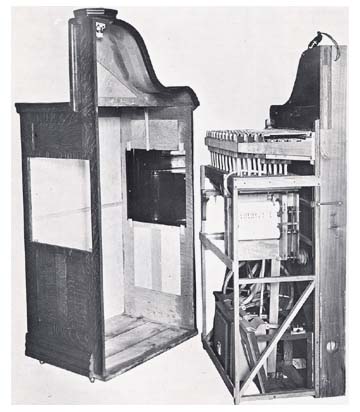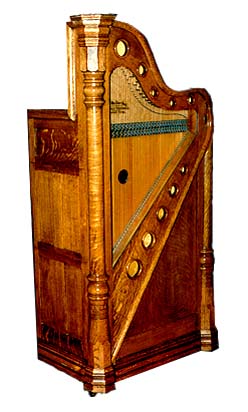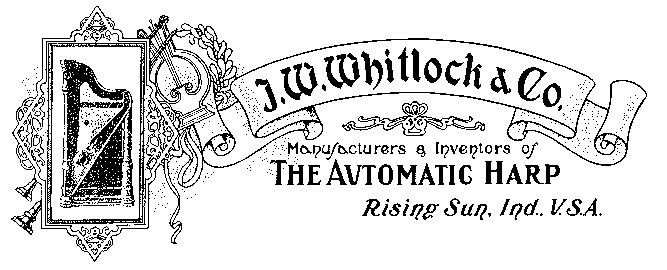| You Are Not Logged In | Login/Get New Account |
|
Please Log In. Accounts are free!
Logged In users are granted additional features including a more current version of the Archives and a simplified process for submitting articles. |
|
MMD
 Pictures
Pictures
 wurlharp
wurlharp
|
|
courtesy Don Teach
Mike Knudsen wrote in 970528 MMD: The tone is soft, but a bit brighter (more nasal and twangy) than
a hand-played harp. There is no expression, but the arrangement of
"Claire de Lune" that I heard was beautiful (it seemed to be an exact copy
of Debussy's piano score). This harp was coin operated. It
would be a perfect instrument for a small home shared with a spouse who
doesn't go for ricky-tick, razz-ma-tazz, monkey music :-) 
Historian Dick Bueschel wrote in 970529 MMD: Wurlitzer Player Harp and the Law
Hurrah for the MMD subscribers. The responses about the coin-op Wurlitzer harps are perfect. It's all there. History, models, etc. I want to note that my forthcoming book, Let The Other Guy Play It (Royal Bell Books, April 1998), will reproduce the original catalog pages for both Model A and Model B harps, as well as a location photograph showing a Model A in a bar. The Wurlitzer harps had two problems: the law, and the weak sound. Wurlitzer spent classical money to get the laws changed across America. It happened in at least three or four major cities. For instance, in San Francisco, around 1905 the city council passed a law outlawing all music from bars and bordellos. Once passed, two weeks later they passed a law saying the only allowable music was a coin-operated harp. Guess who? Only Wurlitzer had them. The San Francisco papers said that the saloon keepers quickly stumbled all over themselves to contact a representative of "...a Cincinnati music machine company." Guess who again? That was the home office of Wurlitzer. They had "iced" the whole country. But they didn't have the product! The problem with the harp is that you couldn't hear it over the din of a bar. Even today, as beautiful as it sounds, you'd better be in a quiet room and very close to the machine. So in barely a year, the harps were in, then tossed out, and the lawmakers across the country had to re-write their acceptance rulings in order to set up an area of graft they had literally killed when they went for the Wurlitzer "suggestions." Fortunately for Wurlitzer, their pianos were included. But so were everybody else's. It opened up the market to more pianos, and the orchestrions to follow. There's a lot more to this music than the music alone. This mechanical music history stuff -- it's GREAT! Dick Bueschel
Mark Forer wrote in 9990106 MMD: Coin-Operated Entertainment in San Francisco
... quoting from the excellent (and sordid)history of the Barbary Coast in Herbert Asbury's book, "The Barbary Coast: An Informal History of the San Fransisco Underworld", Garden City [Knopf] Publishing Co., Inc., Copyright 1933, Garden City, New York, Chapter X, "Company, Girls!", page 245: -- begin quote -- The parlor houses also derived a considerable income from the sale of beer in bottles and hard liquor by the half-pint and from music. Practically every resort was equipped with some sort of automatic -- and in later years electrical -- musical instrument, which played only when fed nickels and quarters. A great deal of the revenue from the music and sale of liquor went to the police and politicians as graft, in addition to the regular payments, which were usually based on the number of girls in a house. Sometimes besides taking most of the coins which had been dropped into the machine, the greedy grafters levied a special unofficial tax upon each musical instrument; or ordered all music stopped and then permitted its resumption upon payment of another so-called tax or license fee... In the late spring of that year [1911] the police forbade all music in the houses of prostitution and ordered the removal and destruction of every musical instrument in the red light district. A month later, in July, the proprietors of the houses were told that they might provide music for the entertainment of their guests, but that it must be the music of the automatic harp. There wasn't such an instrument in the Barbary Coast, but the lack was soon remedied. A few days after the bagnio-keepers had been notified, a salesman for a Cincinnati piano house appeared in the district and offered automatic harps for sale for $750 each, about four times what they could have been bought for in the open market... Practically all of the parlor houses were in two-or-three-story buildings which had once been private residences. When they were transformed into bagnios, the interior arrangements were usually altered to provide additional bedrooms, and, if possible, the living room or parlor was enlarged... The parlor was a potpourri of gaudy rugs, erotic paintings or photographs, garish couches and divans, and heavily gilded chairs and tables. In one corner was the omnipresent automatic or electrical musical instrument, and in some places a small section of the floor was cleared for dancing... Whether or not the visitor made his selection immediately, he was importuned to purchase liquor or provide coins for the music... In a few resorts the girls wore no clothing whatever, except slippers and stockings... Besides the automatic instrument which required nickels and quarters to burst forth into melody, Madame Bertha's house boasted an organ, upon which the mistress of the bagnio performed with rare skill. On Sunday afternoons she closed the resort for an hour or two, except for specially invited guests, and during that time, becomingly attired in black silk, she played sentimental airs on the organ, while the harlots and the guests sang." -- end of quote -- I might add that on page 24 is displayed a photo captioned "Gay Dogs of the Barbary Coast"; it is of two harlots, and three patrons gathered around a parlor piano, the very same photo which may be glimpsed briefly in the opening montage of the TV show "Cheers." Obviously, the salesman from the "Cincinnati piano house" was a rep from Wurlitzer, cashing-in big-time along with the politicos. Barrel orchestrions had been around in the very late 1800's, and the electric automatic piano had been invented soon after the turn-of-the-century. Seeburg perfected and simplified the coin-op automatic around 1908; all apparently went to the scrap heap to make way for the Wurlitzer harp as described above. The goings-on quoted above may seem quaint and amusing now, but what went on in San Francisco, as chronicled by Asbury at the time, was shameful beyond belief, and makes the "sins" of today almost tepid by comparison! Happy New Year! Mark Forer
25 August 1999 |
|
|
|
|
|
|
|
|
|
CONTACT FORM: Click HERE to write to the editor, or to post a message about Mechanical Musical Instruments to the MMD Unless otherwise noted, all opinions are those of the individual authors and may not represent those of the editors. Compilation copyright 1995-2026 by Jody Kravitz. Please read our Republication Policy before copying information from or creating links to this web site. Click HERE to contact the webmaster regarding problems with the website. |
|
|
||||||
|
 This
instrument was built for Wurlitzer by the J. W. Whitlock & Company
of Rising Sun, Indiana. Pictured here is the rare Wurlitzer Style
B Automatic Harp, in an ornate case of quarter-sawed golden oak.
The sixty strings are plucked by a harpsichord-style mechanism controlled
by an electric powered pneumatic roll player.
This
instrument was built for Wurlitzer by the J. W. Whitlock & Company
of Rising Sun, Indiana. Pictured here is the rare Wurlitzer Style
B Automatic Harp, in an ornate case of quarter-sawed golden oak.
The sixty strings are plucked by a harpsichord-style mechanism controlled
by an electric powered pneumatic roll player.
